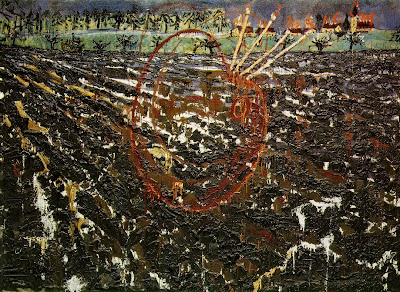“The Poles are within us, insurmountable while waking…”—Paul Celan
Hi Dark Nerve,
You wrote, “It is fair to say that we could all benefit from developing a certain double-mindedness so that we can grow more comfortable with paradox—because paradox is the rule and not the exception. Our consciousness will remain limited to what we see, hear, touch, taste and smell until we begin to utilize our inherent gifts of telepathy and clairvoyance…
“We should not be too eager for strict interpretations of our place or purpose in the larger scheme of things. The strict logician refuses to open his senses to the divinatory aspect of human consciousness and is therefore unable to see and hear his way into other worlds. Because he finds the prophetic problematic, he seeks evidence to support his incomprehension…. The ultimate nature of the riddle of the universe will not be fully discerned by either the credulous or the skeptical. We must move beyond skepticism and superstition to even grasp an iota of the complexity of our role as humans in this vast universe. There are always unknown quantities lurking beneath the surface of what we call reality.”
I sometimes feel that we are standing side by side on a ledge, overlooking a vast landscape—exploding with life and pulsing with arcane geometries—which we are attempting, in our own small and yet inventive ways, to describe.
"Those would seem to be conifers,” says one, “but what are they doing so far south?” “Yes,” says the other, “and why does that road appear to lead to a constellation? Perhaps, a few feet down, there is a megalithic complex where it intersects with that other road, whose outlines are just visible when we view it from this distance.” If we listen, we can hear the stones hum, as if they were giant batteries, supercharged with Vril.” In a shift of focus, the first one then remarks, “Have you noticed how the sun keeps changing color? It started out as yellow, then went to black, and it is now a kind of Islamic green.” “I am quite familiar with this particular shade of green,” says the other. “It is the green of a hieroglyphic leaf on the World Tree, the green of the Tablets of Hermes Trismagistes.”
The sun rises and sets simultaneously. Many years pass in a fraction of a second. Says the first, “I feel certain that we are standing at 30 degrees longitude, and 33 degrees latitude—just west of the center of the landmass of Pangaea. Already, we can observe a few tectonic cracks, from between which leaks the light of a split atom.”
“We cannot stay here long, in this state of free-associative transparency, “says the other. “But, then again, perhaps ‘space is the place,’ as Sun Ra said; it is always possible that there is nowhere else to go. Even now you can hear the chant of the intoxicated multitudes, as they praise the current that has taught them how to die. Their Kamikaze battle cries are not different from their laughter. ‘Space is the place’—first rising on a froth of drums and flutes, the mantra circulates around the four corners of Pangaea, before crashing against the ‘glass ceiling’ of a 64 cube tetrahedron.”
Meanwhile, small groups of critics are always eager to remind us of the laws and prohibitions that we have somehow overlooked. For example, “You shall not make for yourself a carved image, or any likeness of anything that is in heaven above, or that is in the earth beneath, or that is in the water under the earth; you shall not bow down to them nor serve them. For I, the Lord your God, am a jealous God, visiting the iniquity of the fathers on the children to the third and fourth generations of those who hate Me…”
“Do you not know that it is impermissible to comment on a tree?” says one critic, “Since no one tree can embody the full breadth or complexity of Nature.” “Similarly,” chimes in another, “it is best to avoid any self-indulgent talk about the existence of a ‘landscape,’ since a ‘landscape’ is just an abstraction made from individual trees.” And so on, and so forth—ad infinitum. Who needs reptilian overlords when we are all so willing to subvert our own perceptions? Such criticisms are quite often labyrinthine in their stealth, and can be just as easily phrased in the language of scientific reductionism, or of social justice, or of a popularized version of Zen Buddhism; behind it all, there is a Western distrust of direct contact with the Absolute that goes back many thousands of years.
“When the student is ready, the teacher will appear,” or so the saying goes, but there is no law that compels our teachers to be patient. Fed up, they may just have decided to grab us by the hair. Now, as the sun is plunging towards the Earth, with its color changing from one moment to the next, with its eight arms, like superweapons, rotating, sending waves of fear through the majority of Earth’s 7 ½ billion: it is possible that, at last, we will have sufficient light by which to read. If so, the age of the light bulb will be over.
(Illustration: Deniz Ozan-George, Untitled, 2010)






